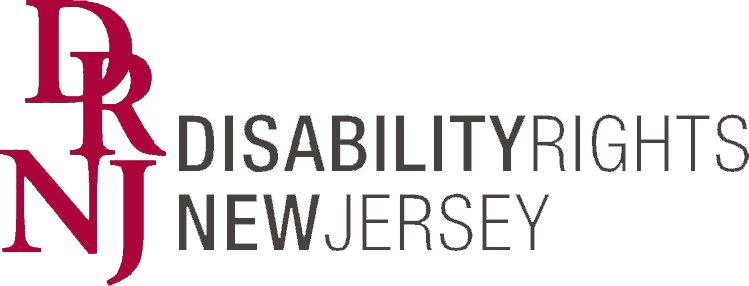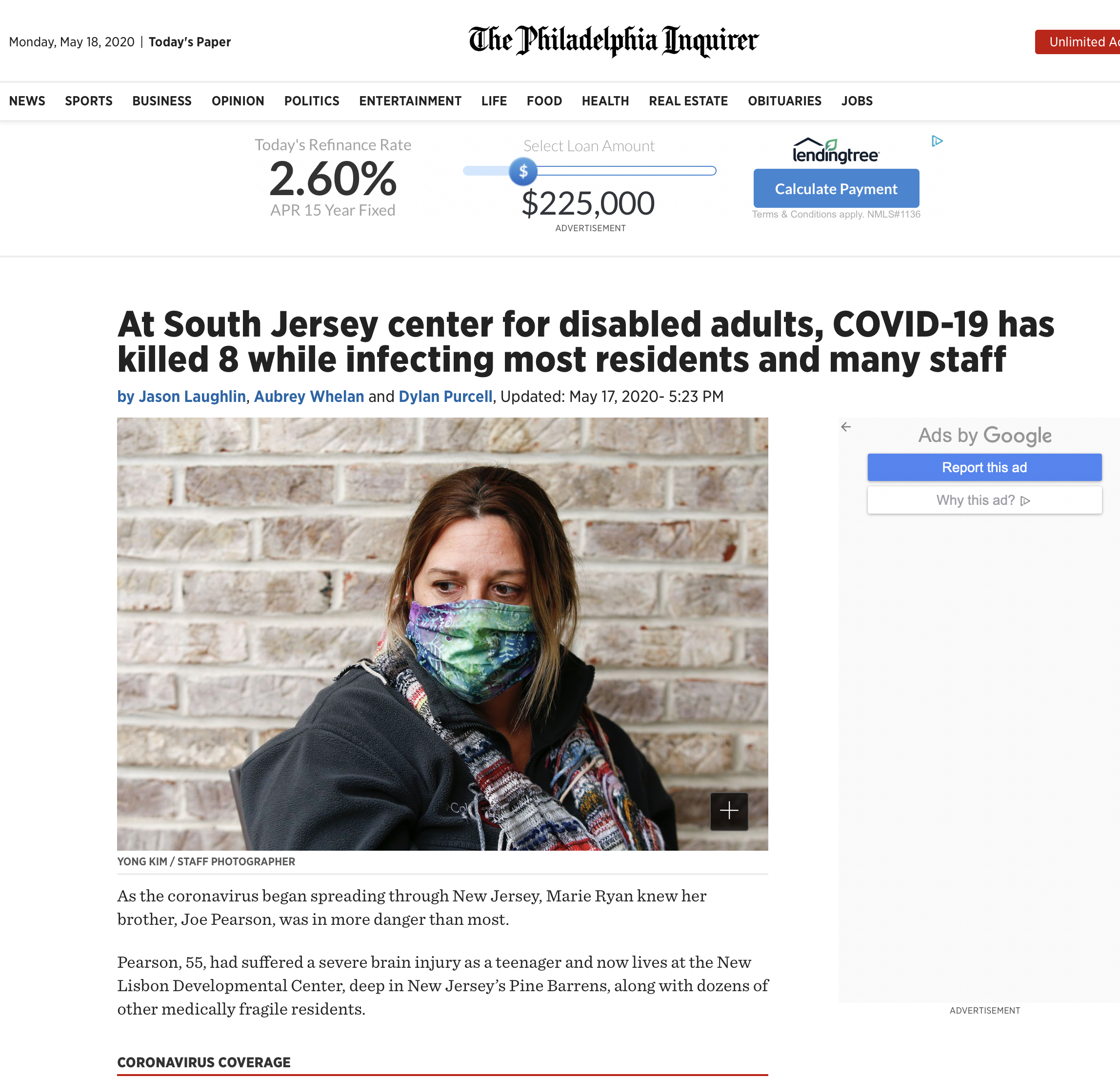Nursing Home Care
The nation’s 1.3 million nursing facility residents are among those at the greatest risk of illness and death from COVID-19. The virus is spreading ruthlessly in nursing homes across America, and sadly, New Jersey’s residents have not been spared. Shortages in PPE, lapses in care due to staffing issues, a lack of transparency from facility administrators, and inadequate precautions taken to control the spread of the virus, are causing our most vulnerable population to suffer, and in some cases fall victim to this pandemic.
At Disabilities Rights New Jersey, we have the unique authority to monitor care facilities and nursing homes, as the state’s designated protection and advocacy agency, however due to the visitation restrictions placed by facilities, and stay at home orders, we have not been able to access places like Andover Subacute and Rehabilitation Centers I & II where New York Times article recently revealed "After Anonymous Tip, 17 Bodies Found at Nursing Home Hit by Virus," April 15, 2020.
In a letter sent to Governor Phil Murphy and Department of Health Commissioner Judith M. Persichilli, Gwen Orlowski, Executive Director of Disability Rights New Jersey asked for more oversight of facilities in New Jersey including Andover Subacute and Rehabilitation Center, stating these allegations are "so serious, that all oversight and protective agencies and authority should be brought to bear for the health and safety of the residents."
Disability Rights New Jersey will continue to meet its responsibility under federal law to investigate allegations of abuse, neglect, and suspicious deaths of individuals with disabilities who reside in New Jersey’s long-term care facilities, as well as provide legal representation to individual residents with disabilities. Disability Rights New Jersey is concerned that Andover I and II are not the only facilities where residents are facing these dire circumstances.
As of April 30th, we have begun virtual monitoring meetings of facilities to ensure the safety and health of residents.
October 19
If you have questions or concerns about how voting will work this year for residents in long term care, the New Jersey Hospital Association hosted a webinar on October 19th called Voting Rights in the Age of COVID-19 for Residents in Long Term Care Settings. It featured speakers from the NJ Long Term Care Ombudsman’s Office and Disability Rights New Jersey. The NJ Department of Health and NJ Division of Elections were also available to answer questions. View the webinar slides below.
October 5
The Centers for Medicare & Medicaid Services (CMS) is affirming the continued right of nursing home residents to exercise their right to vote.
While the COVID-19 Public Health Emergency has resulted in limitations for visitors to enter the facility to assist residents, nursing homes must still ensure residents are able to exercise their Constitutional right to vote.
States, localities, and nursing home owners and administrators are encouraged to collaborate to ensure a resident’s right to vote is not impeded.
For the full guidance, please click the button below.
August 13
Gwen Orlowski, Executive Director of Disability Rights New Jersey, testified during the joint hearing before the Senate Health, Human Services and Senior Citizens Committee and the Assembly Aging and Senior Services Committee in support of the legislative bills designed to address the problems in long term care facilities that were exposed during the COVID crisis. The bills were introduced as a result of the recommendations of the Manatt Report, and call for greater accountability and oversight of long-term care facilities, including ownership; increased public dollars tied to quality measures, and enhanced rates and benefits for direct care staff; and a partnership with managed care organizations in an effort to improve quality.
In addition to expressing our support for these bills, Disability Rights New Jersey educated lawmakers about our unique role as the protection and advocacy system in New Jersey for individuals with disabilities. In this role, Disability Rights New Jersey investigates and monitors all types of facilities including long-term care facilities to ensure that individuals with disabilities of all ages are not subject to abuse and neglect. While the primary responsibility of the Long-Term Care Ombudsman is to represent residents 60 and older, we provide a voice for individuals with disabilities of all ages in nursing facilities, and therefore requested that we should be included as a part of any task force or committee that addresses long-term care facilities.
August 10
Governor Murphy Announces $155 Million in Additional Funding to Ensure Health, Safety and Quality in Long-Term Care Facilities
July 16
Disability Rights New Jersey created an FAQ document for families and caregivers with questions about the recent guidance from New Jersey Department of Health (DOH) and The Centers for Medicaid and Medicare Services (CMS). This FAQ provides advocacy advice for situations where the stricter policy may infringe on a resident’s rights. This FAQ is intended to help you navigate the latest rules and regulations that govern nursing home visits.
July 9
Nursing homes are starting to resume in-person visits for families in many states as COVID-19 restrictions ease. These visits will be different than before the pandemic, at least for some time. There may be limits on when, where and for how long you can see loved ones, and distancing rules will likely be in place. AARP has developed some key questions to ask nursing homes, assisted living, and other long-term care facilities — and yourself — about when and how visitation might resume.
June 24
In a letter sent June 24, 2020 to Department of Health Commissioner Judith M. Persichilli, Gwen Orlowski, Executive Director of Disability Rights New Jersey asked the Department of Health to extend this policy to people with disabilities residing in state long-term care facilities, more commonly know as nursing homes.
Disability Rights NJ Sends Letter to DOH to Extend Support Person Policy to Nursing Facilities
Friday, June 19, New Jersey Department of Health Commissioner, Judith Persichilli, issued Executive Order No. 20-017 Standards and Protocols for Visitors and Facility Staff.
The order provides social distancing visits at long-term care homes, long-term care facilities, pediatric transitional care homes, assisted living residences, comprehensive personal care homes, and assisted living program. View the NJ DOH Executive Order below.
May 18
At South Jersey center for disabled adults, COVID-19 has killed 8 while infecting most residents and many staff
Gwen Orlowski, executive director of the advocacy organization Disability Rights NJ, said she believes state officials were “doing everything within their power to try to prevent the spread of the disease as best they could, given the fact that they really didn’t know who had the virus.” But without being able, early on, to test asymptomatic staffers who come and go from the facility, residents couldn’t be protected, she said.
April 28
Justice in Aging, the national non-profit legal advocacy organization that fights senior poverty through law, along with 45 national and state organizations, sent a letter to Centers for Medicare and Medicaid Services Administrator Seema Verma, outlining six concrete recommendations that will offer more protection to residents, and better support residents’ ability to make decisions regarding their health care and place of residence.
The six recommendations are (in a condensed form):
Require immediately that nursing facilities disclose whether residents or staff have been infected by COVID-19.
Keep residents safe by setting meaningful standards for the necessary staff, training, and equipment to care for residents with COVID-19 and those without.
Combat isolation by requiring nursing facilities to actively coordinate and facilitate telephone calls, video conferences, and other communications between residents and their family members and friends.
Avoid disruption by requiring facilities and states to work collaboratively with residents and their families when making transfers designed to “cohort” residents with others who also are COVID-positive, or COVID-negative.
Give residents a greater ability to move in with family during this emergency, by guaranteeing a resident’s right to return to the facility, if desired, and facilitating access to Medicaid home and community-based services.
Require all federally-certified facilities to accept Medicaid, in every room in the facility.
April 19
April 17
Letter to Governor Murphy & DOH in Response to Allegations of Neglect at Nursing Facilities
Gwen Orlowski, Executive Director of Disability Rights New Jersey asked for more oversight of facilities in New Jersey including Andover Subacute and Rehabilitation Center, in which a New York Times article recently revealed "After Anonymous Tip, 17 Bodies Found at Nursing Home Hit by Virus," April 15, 2020. The complete letter is available to read where we ask the Department for full transparency and to include the names of the specific facilities where there are COVID-19 outbreaks.
After Anonymous Tip, 17 Bodies Found at Nursing Home Hit by Virus
The police in a small New Jersey town had gotten an anonymous tip about a body being stored in a shed outside one of the state’s largest nursing homes. “They were just overwhelmed by the amount of people who were expiring,” said Eric C. Danielson, the police chief in Andover, a small township in Sussex County, the state’s northernmost county.
April 15
During the COVID-19 pandemic, guardians for older adults and adults with disabilities may have questions about fulfilling their duties and staying connected to people they represent. Guardianship experts, including the National Guardianship Association, ABA Commission on Law and Aging, and the National Center for State Courts, have created the FAQ document linked below with answers, actionable tips, and links to key resources. This resource is aimed at family guardians, professional guardians, public guardians, attorneys, judges, court personnel, and all others who are affected by this issue, and will be regularly updated with new information and links.




